John Waters, Lea DeLaria & and Other Queer Celebs on P-town's Charms
| 12/30/20
By continuing to use our site, you agree to our Privacy Policy and Terms of Use.
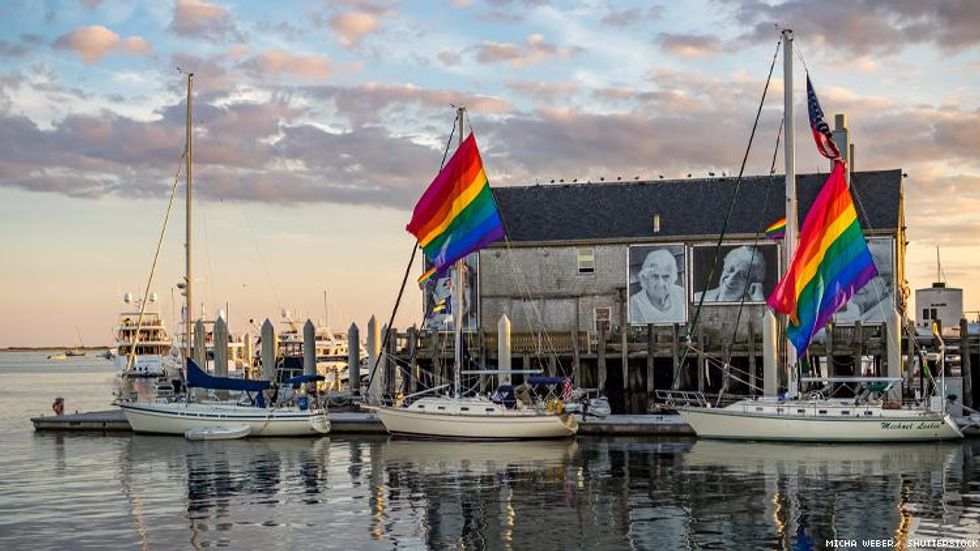
For nearly a century, Provincetown, Massachusetts has been a queer haven, drawing both LGBTQ+ travelers and residents. Tourists flock to the coastal town on Cape Code in the summer for the beaches and LGBTQ+ events, especially the week-long flamboyant Pride celebration, Carnival in August, which brings 90,000 visitors to the town of 3,000.
For year-round residents, Provincetown is a much quieter and smaller town, where queer artists thrive.
Photographer Ron Amato has been photographing many of those LGBTQ+ creatives -- including Lea DeLaria and John Waters -- for his Artists of Provincetown project.
Out Traveler asked some of them about their work and the hidden Provincetown many tourists miss. See their portraits and read their answers below.
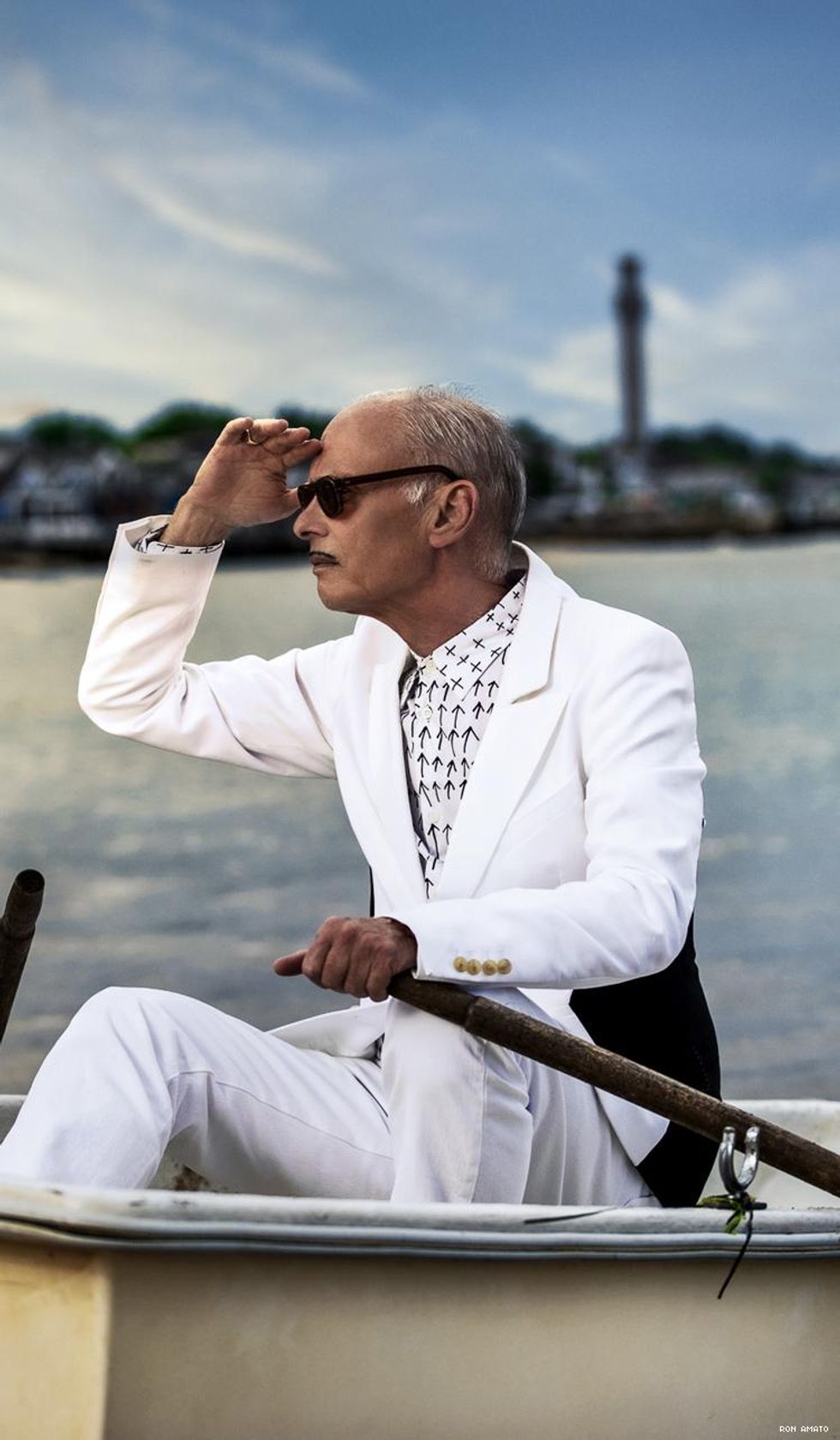
John Waters the icon gay auteur of cult-flicks Pink Flamingoes, Female Trouble, and Polyester, and mainstream hits Hairspray and Cry-Baby, told Queerty last year that he’d been coming to P-town, where he now has a home, for 55 years. “I came here when I was 16, 17," he recalled. "Somebody was like It’s a weird place, you’ll like it. So I hitchhiked here. It was. And I did. I worked for Molly Malone and Mary Oliver, who became a giant poet. Then I ran the Provincetown bookshop for many years as a young man. … My first movie premiered at the church up on Shank Painter Road. I write here.”
Waters also returns each year for the Provincetown Film Festival which he has supported for more than two-decades as it grew into P-town’s premier cultural event, attracting 10,000 visitors for the 5-day festival (currently scheduled to return June 16-25, 2021).
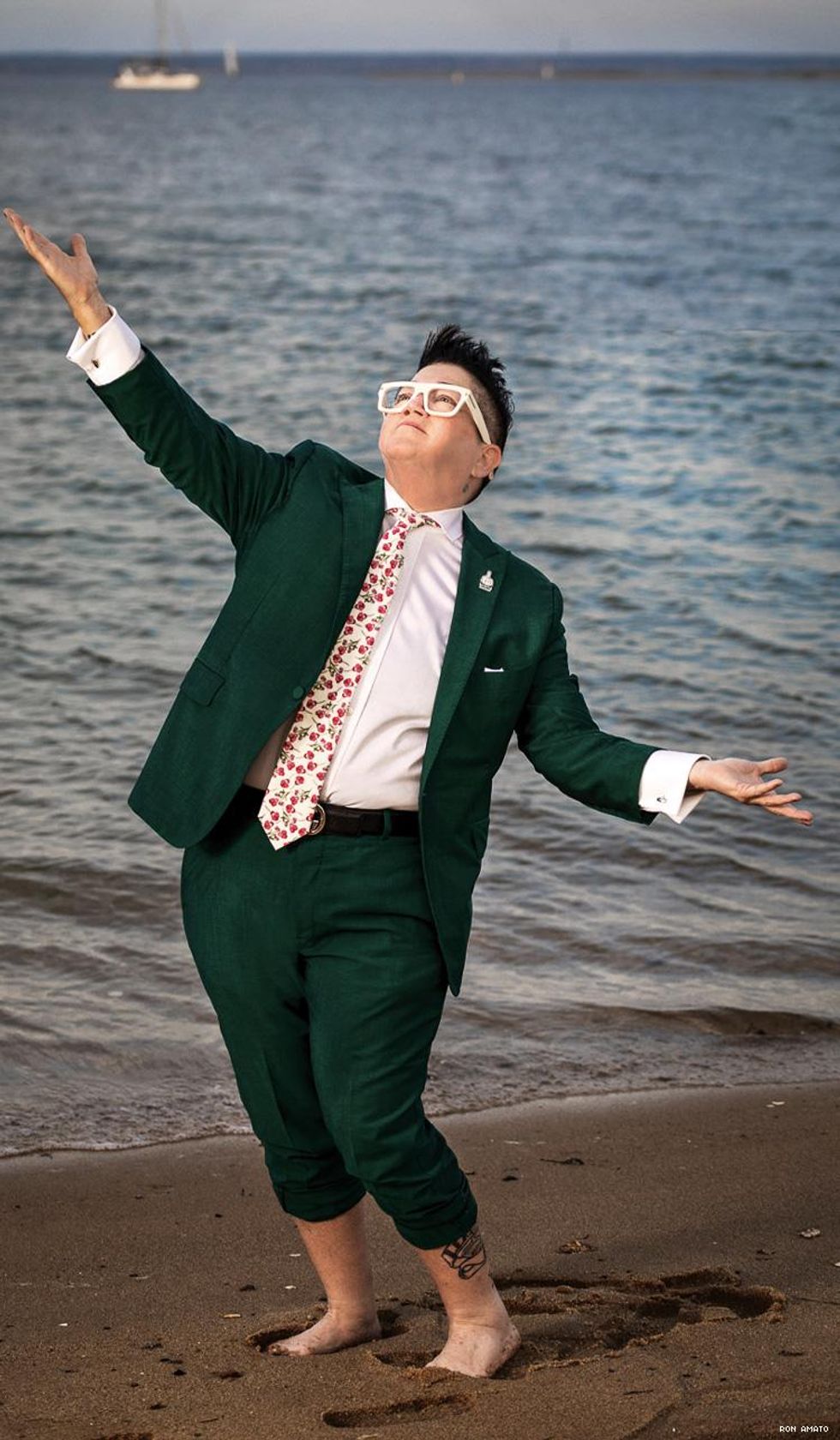
Although she may be best known for her portrayl of Big Boo on Orange Is the New Black and Queenie on Hulu's Reprisal, Lea DeLaria is also a stand-up comedian, musician (check out her jazzy takes on David Bowie's hits), and champion of lesbian bars.
How do you identify?
I identify as butch and my GPP is Empress.
Tell me about the Lesbian Bar Project.
There are only 15 dyke bars left in America. The Lesbian Bar Project is raising funds to make certain that these bars will remain open.
You founded The Club in Provincetown in 2019 so you at least got a season before 2020's troubles. Do you hope to reopen?
My business partner Frank Christoper and I are happy to announce that we will be open next season. Hopefully the rules will allow us to have shows as well.
Tourists are beginning to return (or at least dream of returning), what should they not miss in Provincetown?
No one should miss The Club (what am I stupid? Of course I’m going to plug my business)! Have a fabulous cocktail and an excellent meal with a gorgeous view on the nicest deck in town...I said deck.
You've been a fixture in P-town since the mid-'80s. What keeps you there?
1984 to be exact. I was the first dyke act to perform in PTown. I made my bones and my fame in PTown. I spent every spring/summer and fall there for over a decade. It’s the closest thing to a home that I have ever had, one of the most special and beautiful places on earth.
Where would Big Boo feel most at home in Provincetown? Where would Queenie?
Big Boo would feel most at home at Spiritus Pizza at 1AM. Queenie needs the stage, so competing at Showgirls belting out a tune in a red mermaid tail gown.
Can we expect another album from you soon?
I don’t know about soon. But there will be one, I’m sure.
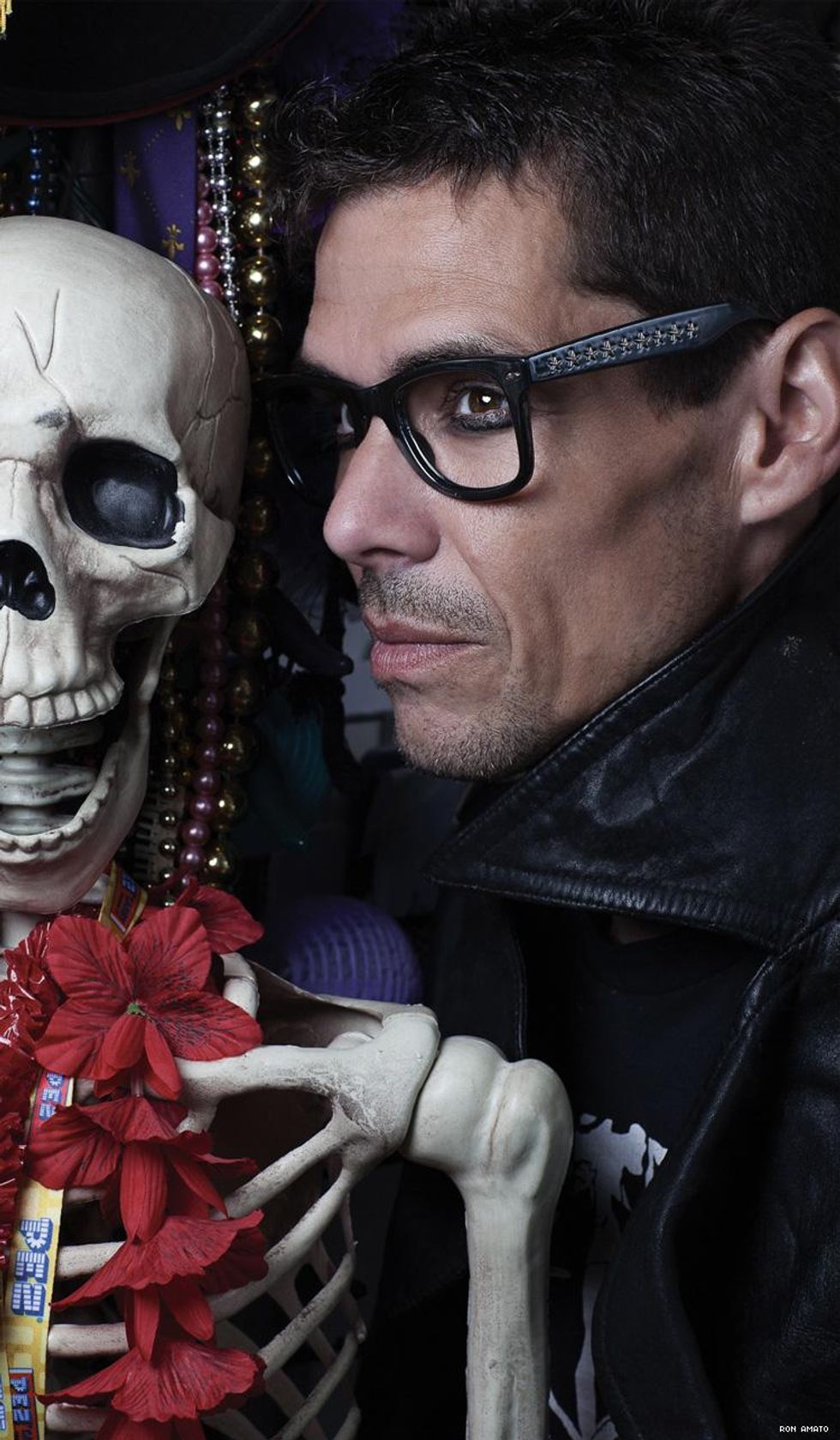
Grotta Bar institution Billy Hough has taken Scream Along with Billy virtual with bassist Sue Goldberg (Space Pussy). But the GarageDogs singer currently isn't manning the lobby piano bar at Gifford House Inn on Saturdays and Sundays. Hough is also known for his show Cocksucker Blues, a randy cocktail of dirty stories, original music, and surprising covers that's a trip through Hough’s disfunctional relationships that ends with the boy of his dreams.
Why is P-town a great place to be a musician?
Provincetown has long been a bastion of bohemians, rockers, musicians of every flavor, artists, so I found my "tribe" here very soon after I began coming here. The audience here is very welcoming and they enjoy being challenged, so I try to push the envelope in terms of song choice and performance as far as they'll let me. I haven't crossed the line yet.
Tell us about Scream Along with Billy.
Scream Along with Billy is myself on piano and mouth, and my partner Susan Goldberg on bass and eyerolls. We do a completely different show every week (currently online of course) often covering entire albums. We've done over 250 albums in our 15 year history: Bowie to Blondie, Nick Cave to Pixies, Courtney Love to Johnny Cash. It's been hugely challenging, and we've kept the show free all these years, partially so we can throw people out. (I'm kind of kidding) But we've never actually advertised the show so it's a show for townies and the people who fuck them.
Before 2020 you packed the Grotta Bar Friday nights and entertained guests at the Gifford House. Do you foresee those days returning?
I do, I mean, eventually folks are going to want to go out and hear music again, in the way we're going to want to do everything again. I admit to being concerned that even when the huge epidemic has somewhat abated, it may still take folks a while to cram in to tiny bars. But we will be there when they do, and we'll just have to keep figuring out how we can entertain folks.
Where is your favorite place or event in P-town to listen to music?
I love the wide variety of street performers here. We have the full gamut of talents, ages and instruments, but many of them are terrific and all of them are entertaining. I think that's something really unusual about Provincetown: that wherever you walk, you can hear music. It must be like the old days in Paris when the streets were full.
When did you first come to Provincetown? What keeps you there?
I came in 1998 with Ryan Landry and the Gold Dust Orphans, a theater company I co-founded with Ryan and his husband Scott Martino, and Andre Shoals. I did a few plays out here one night a week, but did my first full summer here in 2004 after bottoming out on drugs in LA. It was hard to get a second chance, but Provincetown gave that to me. I started the Gifford House in 2005 and Scream Along in 2006, and I've never looked back. I'm currently living here year round because I met the handsomest most brilliant man (a street singer himself), Christopher, and we have been here full time since Summer 2019. We have a wonderful home on a crazy old family compound, and now two little black cats named Goblin and Gremlin, so I'm not going anywhere soon.
When you aren't home, where are you most likely to be?
At rehearsal. Always at rehearsal, or in the studio. My brothers and I have a band (GarageDogs) ane we recorded an album last year Beyond Good & Evil. It'll be out soon.
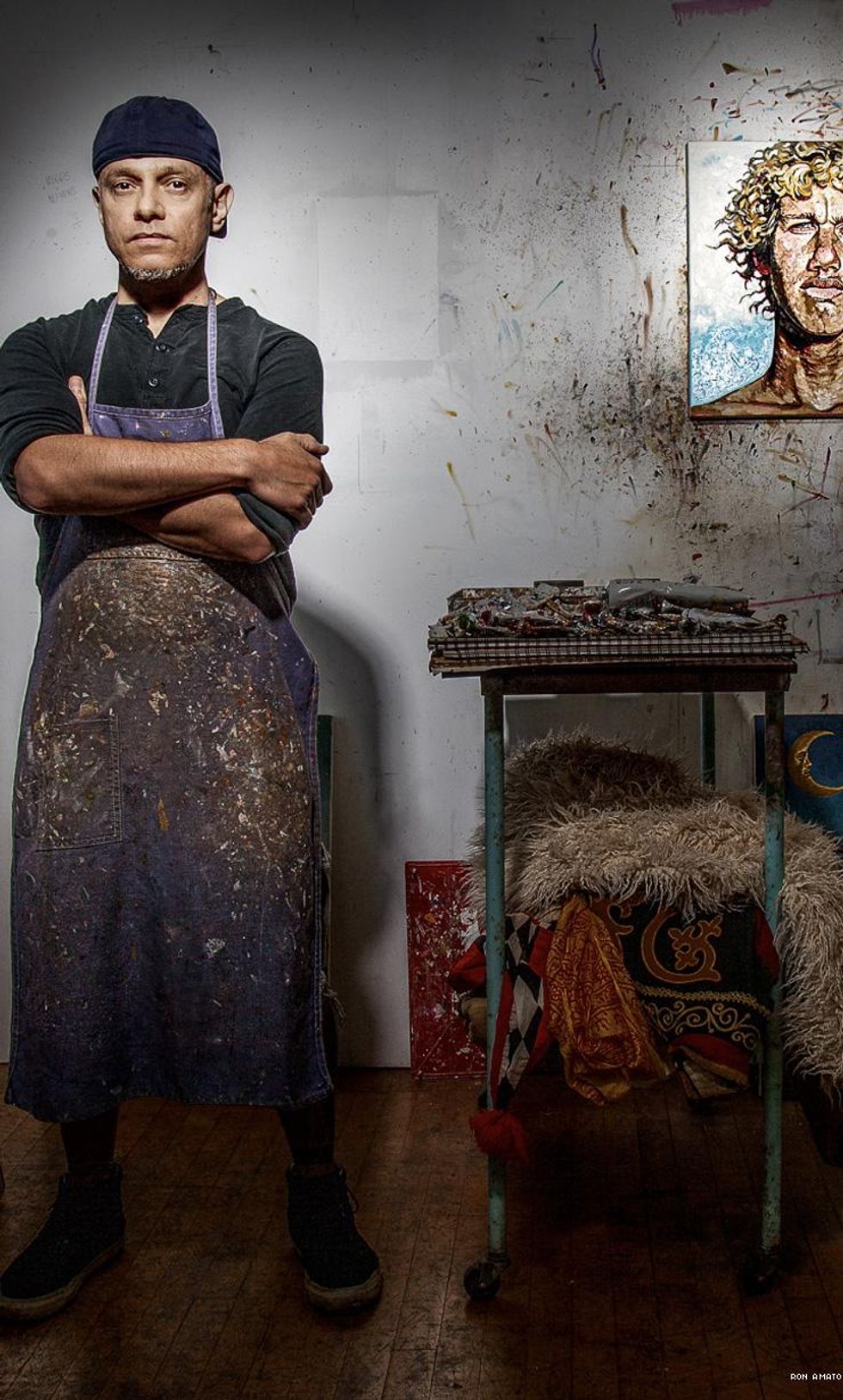
Self-taught painter Christopher Sousa grew up in Massachusetts and visited Provincetown as a child. Then, he says, "In my 20s and 30s I began spending time here with friends and found myself really drawn to the unusual, bohemian lifestyle of the locals. It's OK to be a freak here. There's a whole community of oddballs and free spirits living here that may not be immediately apparent to the summer tourist who rarely ventures far from Commercial Street. That's what attracted me."
How do identify and which pronouns do you use?
I identify as a gay male (he/him) of Portuguese/Italian descent.
You're a painter. What is it about the Provincetown area that makes it a conducive to your work?
Provincetown is a rare place where it's not only acceptable to pursue a career in art, it's encouraged and nurtured. The town is basically seasonal, and only really busy in the summer, so the rest of the year there's plenty of space and solitude which I find essential to my work.
Tell me a little about your portraits and how they recast the male form in a less stereotypical masculine light.
The world of "gay art" is filled with images of uber masculine, muscular, bearded, athletic, macho men. It's a popular stereotype that I personally have never identified with or felt compelled to depict in my work. I'm more attracted to gentleness, softness. I like bookish guys. Slightly androgynous guys. Music nerds. Artsy types. I often find myself giving models directions such as "don't flex your muscles," or "soften your gaze." I see a natural beauty and sweetness in guys that I try to convey on the canvas.
What keeps you in Provincetown?
After 17 years here, I don't know that I'd function very well if I were to re-enter polite society. I have a great studio space here and have settled into a pleasant, quiet life. I love visiting big cities but always enjoy returning to Provincetown.
Where do you take visitors to see the "real" Provincetown?
I have a few favorite spots, but I'm keeping them secret.
Where do you most look forward to going in town (when it reopens)?
The Old Colony Tap (best jukebox on the East coast,) the Underground, Rosie's Cantina, The Grab & Go Health Bar. And I especially look forward to some live music at the Payomet Performing Arts Center in Truro.
What is your favorite annual event?
The Underground's Winter Beach Ball. They fill the floor of the bar with sand and have a live band and everyone wears shorts and bathing suits in the middle of winter. It's a party just for the locals. Always super fun!
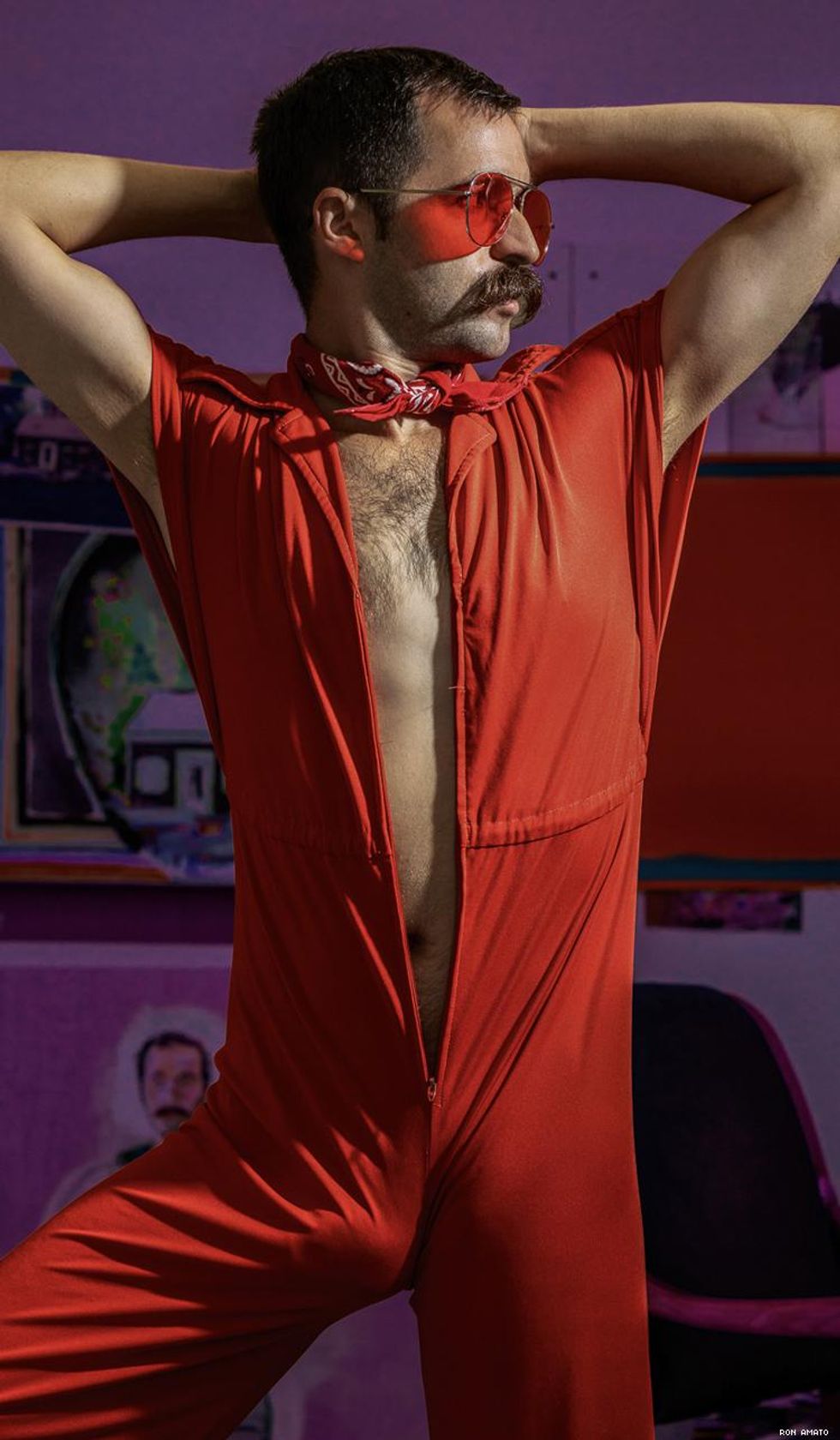
"I love the light and the history in Provincetown," Paul Rizzo tells Out Traveler. The artist is primarily a painter, but says he in a lot of directions "including hypothetical magazine covers, self portraits, gay porn, abstraction, text, and collage... I have many obsessions and within that different parts of the past, old Hollywood, but I’m definitely obsessed with the 1970s. I love a lot about the '70s and early '80s including, music, fashion, gay culture, and of course porn. I’m not sure where my obsession with the 1970s came from other than I’ve started to believe maybe I was reincarnated and was previously someone living in that time. There are many things I like about the porn from that time period ('70s to early '80s), especially within the magazines. I love the fonts, the ads, the pinups, the imperfections, the color blocking and how hand-done they look. Of course I love the cheesey, pervey plots, and fashions of the movies of the time such as early Joe Cage and a particular early Chad Douglas movie. Bruno is one of my favorite muses of the era and is roughly half of my sketchbook covers."
Another big focus of his work is what Rizzo describes as "dream houses both from life and from imagination. I’m always finding a new house or a landscape that moves me. There is a lot of inspiration locally."
How do you identify?
I identify as a male, a f****t, he/him and queer. I’m half Irish, a quarter Scottish and I think my dad’s grandparents came over from Sicily. Polyester is my drag/ radical fairy name.
What first drew you to the area?
My first summer in Provincetown was around 2011 when I was finishing up at Massachusetts College of Art and Design. I was reading about Provincetown at the time and had a friend in my painting studio whose family had a cute old small Cape Cod house on Bradford Street (with shag carpeting!). My studio and professor suggested I visit Provincetown because of my work. I went for a few weeks that summer and went back the next for my first full summer in Provincetown. After that I was hooked having realized I loved dancing and Provincetown made me realize that didn’t need to look a certain way.
What keeps you there?
It’s always felt like home to me. Whenever I was asked how long I would be here for ( when I first moved here) I would immediately answer “forever,” that was my gut reaction. I’m lucky enough to have a place to live and a studio at The Provincetown Commons and a lot of friends here. The fall is my favorite season but I also love how in the summer the town feels more like a city and in the off season it returns to being a small town. I've also been lucky enough to be a part of Four Eleven Gallery for a couple years now and love being a part of it.
Where do you take visitors to see the "real" Provincetown?
Old Colony Tap, Boy Beach / Herring Cove (the walk-out is amazing ), swimming off the breakwater, galleries, bike trails, restaurants, Fag Bash (dance party), Scream Along With Billy, and Church at Grotto Bar, and PAAM.
Where are you when you're not at home?
I’m usually biking around town, gallery sitting at Four Eleven Gallery, in my studio at the commons, or watching old movies and eating cheese and crackers. I really miss dancing so also very much looking forward to when its safe to have dance parties again.
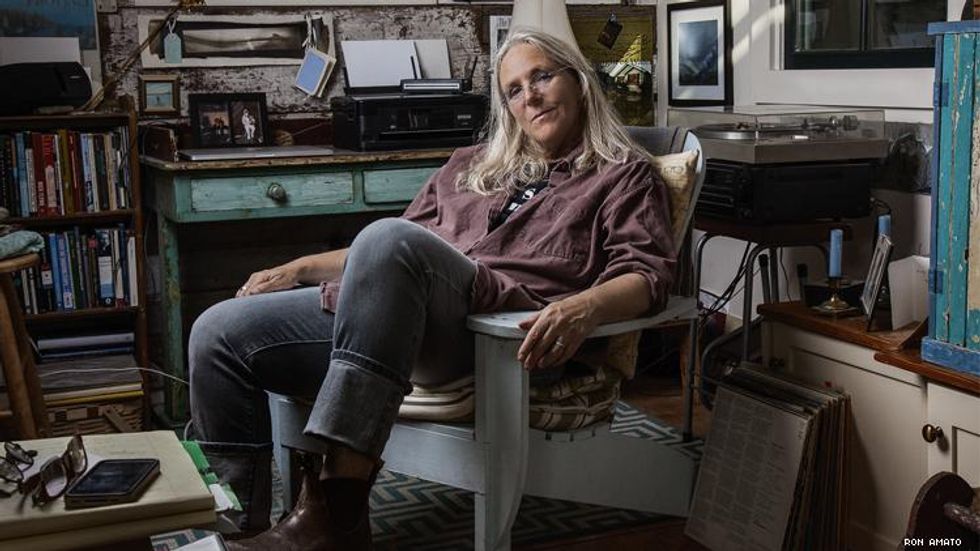
When lesbian playwright Myra Slotnick first visited Provincetown around 1986, she recalls, "The second I saw all the rickety wooden gray houses washed out by salt, all bent toward the long thin street heading into town, like a long lost family; the dunes and sand and the air, the light and the sky, the bicycles -- I was hooked. I always knew I'd 'end up here someday,' which happened for me in 2002. Been here ever since, and don't see myself ever leaving."
You're a playwright. What is it about the Provincetown area that makes it a conducive place to write and put on plays?
Provincetown is the birthplace of the American theater. It is daunting to think about those who washed ashore here to write plays. I believe it was in 1916/17 that Eugene O'Neill spilled out of a train (when the rail was here) with a trunk full of plays. Then it was Tennessee Williams cavorting in the '40s, carrying on in the dunes and at Capt. Jack's Wharf while writing plays on bar napkins at the A-House. There was Susan Glaspell, Edna St. Vincent Millay, the list goes on. Provincetown is all sea. All sky. I am a firm believer in ideas needing lots of room for reflection, you can find that here. And there is plenty of room for production. The town opens itself up to creation. It is thirsty for it.
Tell me a little about The Beachcomber Boys.
I live in the East End of town. I would forever walk my dog and see a gaggle of drunken and unruly men spilling in and out of this tiny shack on the bayside. I came to know who they were and, once I was allowed in the building to take a look around, the history and the haunting of the place knocked me over. I was so intrigued by a society of artists and poets and vagabonds and "old salts" who met every single Saturday night, since 1917, that I wanted to write a musical about them. I'd never written a musical before, but I definitely heard music in this story. I searched high and low for a year and finally found a composer who spoke both Sondheim and Slotnick, a brilliant complicated musician by the name of Peter Stopschinski, from Texas. Most of my close friends in town are artists, so I interviewed one important female artist here and I gleaned everything I could from the language of painting and infused it all into a sort of tortured female leading character in the play, one who orbits the building of the Beachcombers, but never enters. I wove several women into the play, as well as set it in the '50s around the time of McCarthyism. It felt ambitious at the time to write it, and I'm proud of it. On the Centennial of the Bachcombers a couple of years ago, we did a staged reading of the show inside of the Provincetown Art Association and Museum surrounded by all of the glorious Beachcomber art and memorabilia. It was standing room only, the town loved it.
What's your favorite thing about living in Provincetown now?
My favorite thing about living here is community. We have a deep sense of that here. I always say no one will ever go homeless or hungry here, we look out for one another. But also autonomy. I could hide away in my writing place for months, or I could get lost in a dune, or walk Beech Forest. Also, I love that the season ends. It always does, and you get the town back to yourself again. I like it best with no people.
Where do you take out-of-towners?
The first place I take a visiting friend is to the Portuguese Bakery for Malasadas. But I am heartbroken because I just heard that they are selling the building after decades and decades. Second place is Spiritus Pizza, one of my favorite haunts.
When you aren't home, where are you most likely to be found?
When I'm not at home these days you can find me at the grocery store. The only big one on the other side of town. It is where all of town gets to see each other and say hello. That and the Post Office. I can also be seen walking up and down Commercial Street walking my dog. This pup is not a beach girl, but when I had my previous boy, a Golden Retriever, you could always find me on the bay. I met Mary Oliver there one day years ago...she stretched out her arms as wide as they would allow and beckoned him to her.